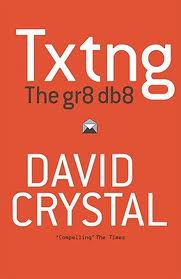
txtng: the gr8 db8
Considering less than a decade ago texting wasn’t even on anyone’s radar, David Crystal, author of txtng: the gr8 db8, can’t help but question if any other linguistic phenomenon ever stirred so many emotions in such a short period of time. Contrary to much popular sentiment against texting, Crystal insists it’s one of the greatest inventions. Just as email began with people breaking the different conventions of language, Crystal believes texters will eventually establish the rules of the genre.
What makes texting distinctive? According to Crystal, six features combine to give the sense of novelty that is making everyone nervous: logograms, pictograms, initialism, omitted letters, nonstandard spellings, shortenings, and genuine novelties. However, in txtng: the gr8 db8, Crystal compiles compelling information to prove these variations are nothing new.
For example, “the Latin initialism pm (post meridiem ‘after midday’) is first recorded in English in 1666.” When compared to established initial phrases like RIP, ASAP, and AKA, newer ones, such as LOL and OMG, don’t seem that unusual. Even the regularly with which texters drop vowels isn’t cause for alarm, Crystal insists, as contractions and clippings have long been accepted despite omitted letters. The reality is that even nonstandard spellings, like thanx, “give the impression of people consciously manipulating the writing system, rather than making inadvertent errors,” according to Crystal.
Therefore, Crystal believes the shortening of words, such as ack(nowledge) and prob(ably), to accommodate the latest technology is a very natural development. “Huge savings of time and money can be made if word-length can be significantly reduced without loss of intelligibility,” he concludes. As far as Crystal is concerned, “What novelty there is lies chiefly in the way texting takes further some of the processes used in the past.”
The problem with texting, as Crystal sees it, is that teenagers do not fully understand the consequences of what they are doing. Therefore, Crystal believes “this is where teaching (in the broadest sense) comes in.” They need to learn how to manage this writing genre just as they would any other.
Crystal also concedes that there is some research that suggests that the sheer brevity of texting is “fostering a reduction of discourse skills” and classrooms will need to compensate accordingly. However, he’s quick to point out that some research suggests that “texting actually helps the development of communication skills such as the ability to summarize and express oneself concisely.”
Unfortunately, since the publication of txtng: the gr8 db8, more and more research has surfaced that indicates tweens, ages 10-14, in particular do not know how to switch from the word adaptations of texting back to the formal writing academia requires. Therefore, while texting might be the “latest manifestation of the human ability to be linguistically creative and to adopt language to suit the demands of diverse settings,” as Crystal claims, this exciting evolution of language might result in a depressing reality of struggling writers.
Follow @WinterhalterV on Twitter for updates on blog posts or like Parenting by the Book on Facebook.
Read my other blog Befriending Forty.






